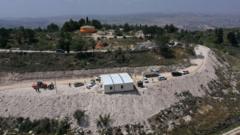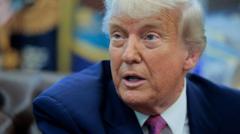As the stakes escalate in U.S.-Iran relations, both leaders face differing strategies on dealing with Tehran's nuclear ambitions.
**Tensions Rise as Israel Threatens Strikes on Iran Amid Trump's Nuclear Negotiations**

**Tensions Rise as Israel Threatens Strikes on Iran Amid Trump's Nuclear Negotiations**
Amid ongoing efforts to negotiate a nuclear deal with Iran, Israeli Prime Minister Benjamin Netanyahu is pushing for military action against Iranian facilities, creating friction with President Trump.
As the Trump administration works tirelessly to secure a nuclear agreement with Iran, Israeli Prime Minister Benjamin Netanyahu has been vocal about his readiness to conduct military strikes on Iran's primary nuclear enrichment sites. This aggressive stance has emerged amidst concerns that Iran may not be amenable to a diplomatic resolution to curtail its nuclear capabilities.
Reports indicate that the divergences in strategy between Netanyahu and Trump led to a charged phone conversation, highlighting the complexities of bilateral relations and the challenges posed by Iran's nuclear program. During a recent statement, President Trump expressed optimism about a breakthrough in discussions, hinting at potential announcements regarding Iran's nuclear restrictions. Still, insiders suggest that tangible advancements remain elusive, with ongoing debates centering on uranium enrichment levels and the management of Iran's nearly bomb-grade nuclear fuel.
It has been previously reported that Netanyahu had intentions to target Iranian nuclear sites as early as this month but was deterred by Trump’s desire for continued diplomacy with Tehran. Despite the lack of official participation in U.S.-Iran negotiations, Netanyahu remains adamant in his pursuit of military options, reflecting a strategic disparity between the two leaders in navigating Iran’s vulnerabilities.
The current situation illustrates the intricate balance the U.S. seeks to maintain amid rising geopolitical tensions and the critical decisions that lie ahead in fostering stability in the Middle East.
Reports indicate that the divergences in strategy between Netanyahu and Trump led to a charged phone conversation, highlighting the complexities of bilateral relations and the challenges posed by Iran's nuclear program. During a recent statement, President Trump expressed optimism about a breakthrough in discussions, hinting at potential announcements regarding Iran's nuclear restrictions. Still, insiders suggest that tangible advancements remain elusive, with ongoing debates centering on uranium enrichment levels and the management of Iran's nearly bomb-grade nuclear fuel.
It has been previously reported that Netanyahu had intentions to target Iranian nuclear sites as early as this month but was deterred by Trump’s desire for continued diplomacy with Tehran. Despite the lack of official participation in U.S.-Iran negotiations, Netanyahu remains adamant in his pursuit of military options, reflecting a strategic disparity between the two leaders in navigating Iran’s vulnerabilities.
The current situation illustrates the intricate balance the U.S. seeks to maintain amid rising geopolitical tensions and the critical decisions that lie ahead in fostering stability in the Middle East.






















